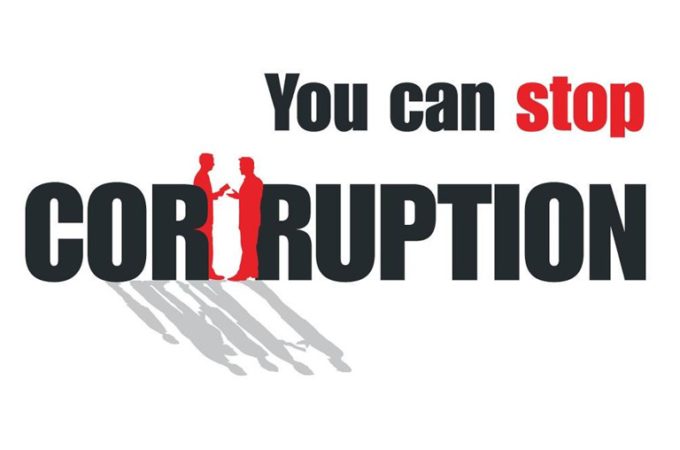[from part 2] Corruption is not moral in one country and immoral in another. Corruption and stealing are harmful to people in any country. The creation mandate applies to every person in every country, as does the “love your neighbor” principle, and the commandment to not steal. There is a divine judge—God—who will someday judge every person.
What to do about corruption? Here are four suggestions.
First, stop it!
 If you are taking bribes, or giving bribes – stop it. If you are cheating on your taxes – stop it. If you are telling a lie to extract a government benefit – stop it. If you are making decisions in favor of the few based on their wealth and influence—stop it. You are hurting others. You are stealing from them.
If you are taking bribes, or giving bribes – stop it. If you are cheating on your taxes – stop it. If you are telling a lie to extract a government benefit – stop it. If you are making decisions in favor of the few based on their wealth and influence—stop it. You are hurting others. You are stealing from them.
This is easy to say but hard to do. People struggle because the incentives to go along with corruption are so great. It is especially difficult when not paying a bribe stands in the way of what seems to be a much greater good.
A friend of ours, Tom, and his partners had a fantastic development program going on in a country in Southeast Asia. The program was helping local farmers move to a sustainable cash crop. They had built a soybean-oil processing mill thereby creating a dependable market for local farmers to grow and sell soybeans. The whole project was eventually derailed because local officials kept putting up barrier after barrier in terms of bribes. They needed ongoing approval for various parts of the project and the officials simply would not sign papers without a bribe. Tom wouldn’t pay. Nothing got done. Eventually he had to close the factory and leave. The farmers lost their soybean market. Because the government was politically oppressive, the farmers could not complain. Did our friends do the right thing considering all the people who were being helped because of the project? This is the hard reality of corruption.
At other times the cost may be personal hardship. My colleague Scott recently traveled to a West Africa country. As he was leaving, the customs office at the airport wouldn’t stamp him out of the country unless he paid a bribe. Scott said he wouldn’t. The official insisted and after about 10 tense minutes, he relented. But what if he hadn’t? What if Scott had missed his flight? What if he had an urgent reason, say a wedding or funeral, to get home?
That’s the hard reality of corruption at the individual level. You know in your heart you need to “stop it” but other factors make it really hard.
Do you give in for the perceived greater good or do you keep feeding the cancer that is killing the nation in the first place?
There is no easy answer, but we do have a powerful God who desires to give us wisdom, courage, and strength in every situation through His Holy Spirit when we ask Him for it.
Second, speak against it.
As a pastor, a business owner, a neighbor and a friend, let people know that corruption directly undercuts the development of your community and nation. Corruption violates the principles put in place at creation by which every person, family, community and nation can develop and flourish. Corruption limits progress for all on all levels – economically, socially, physically and politically. It reduces productivity and wealth.
Don’t secretly (or openly) applaud the co-worker who is cheating and getting away with it. Remind people of the biblical principles mentioned above, and their implications. Let people know that corruption is not a victimless crime. The public always pays with a poorer economy and living condition. Corruption costs lives, dignity, freedom, health and money. It is a major obstacle to democracy and the rule of law. It depletes public wealth – roads don’t get built, education suffers. It corrodes the social fabric of society. It undermines trust in the political system, in its institutions and its leadership. It hurts the environment where people live.
Speak out. Changing systemic corruption requires public disapproval and intolerance of corruption – which then shapes the culture, which shapes the systems and institutions of culture.
Here, too, there can be great danger and hardship in speaking out. Seek wisdom and strength from God.
Third, pull back the covers.
 It is easy to do wrong when no one sees it. But, shine the public light on private behavior and people will often change. (For those who practice it, corruption is only sin if you get caught!) No one likes to be seen and known as a “wrongdoer.” Find ways to bring to light what is done in the dark. The framers of the U.S. constitution knew the heart of mankind was not to be trusted and built checks and balances into government for this reason. In one community of Brazil, young people are taking pictures of unfinished government projects and posting them on Facebook to put public pressure on government officials and contractors who are influenced by corruption. Social pressure can go a long way in changing behavior.
It is easy to do wrong when no one sees it. But, shine the public light on private behavior and people will often change. (For those who practice it, corruption is only sin if you get caught!) No one likes to be seen and known as a “wrongdoer.” Find ways to bring to light what is done in the dark. The framers of the U.S. constitution knew the heart of mankind was not to be trusted and built checks and balances into government for this reason. In one community of Brazil, young people are taking pictures of unfinished government projects and posting them on Facebook to put public pressure on government officials and contractors who are influenced by corruption. Social pressure can go a long way in changing behavior.
Fourth, promote free market exchanges and reforms.
If competing private companies are providing services, the customer can bypass the one that requires a bribe. No one pays a bribe if he has other options. If the government controls the rights to water in your town, and the water officials require bribes to get water, people feel like they have no choice.
Be patient and persistent. The Asian Development Bank has found that long-term success is more likely to come through patient and persistent economic, legal, and institutional reforms rather than short-term and largely reactive efforts to punish wrongdoers.
- Dwight Vogt
… to be continued







2 Comments
Ana Roncal
July 22, 2017 - 5:59 amadmin
July 24, 2017 - 8:50 amAna sent the following comment which for some reason is not showing, so I’m pasting it here. Thanks, Ana! (Gary Brumbelow)
I agree with the idea of enduring personal hardship when facing corruption. It is probably the most powerful act of obedience and what renders an enduring victory, breaking with the power of a mentality that tells you you are a fool if you do not submit. The fear of ruining a business, an initiative, a judicial battle, is part of the lie and we need to believe in the release and see that the fear was often not real, darkness flees when truth is exposed.